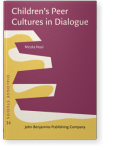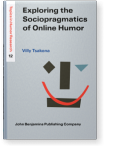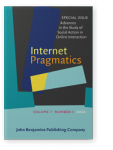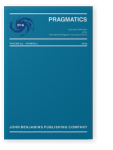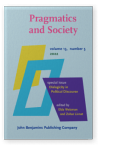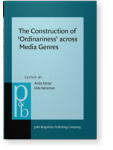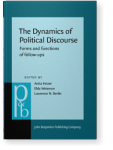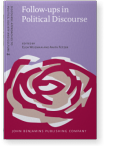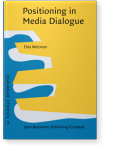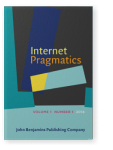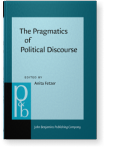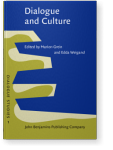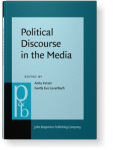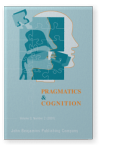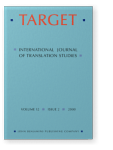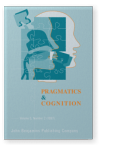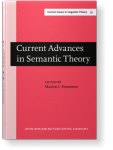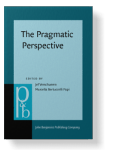Elda Weizman
List of John Benjamins publications for which Elda Weizman plays a role.
Book series
Journals
Dialogicity in Political Discourse
Edited by Elda Weizman and Zohar Livnat
Special issue of Pragmatics and Society 13:5 (2022) v, 154 pp.
Subjects Discourse studies | Pragmatics | Sociolinguistics and Dialectology
The Construction of ‘Ordinariness’ across Media Genres
Edited by Anita Fetzer and Elda Weizman
[Pragmatics & Beyond New Series, 307] 2019. vi, 297 pp.
Subjects Communication Studies | Discourse studies | Pragmatics
The Dynamics of Political Discourse: Forms and functions of follow-ups
Edited by Anita Fetzer, Elda Weizman and Lawrence N. Berlin
[Pragmatics & Beyond New Series, 259] 2015. vi, 278 pp.
Subjects Communication Studies | Discourse studies | Pragmatics
Follow-ups in Political Discourse: Explorations across contexts and discourse domains
Edited by Elda Weizman and Anita Fetzer
[Discourse Approaches to Politics, Society and Culture, 60] 2015. xix, 265 pp.
Subjects Discourse studies | Pragmatics
Positioning in Media Dialogue: Negotiating roles in the news interview
Elda Weizman
[Dialogue Studies, 3] 2008. xiv, 208 pp.
Subjects Communication Studies | Dialogue studies | Discourse studies | Pragmatics | Sociolinguistics and Dialectology
2022 Resemblance in comments/posts interaction: Forms and functions of dialogicity Dialogicity in Political Discourse, Weizman, Elda and Zohar Livnat (eds.), pp. 861–884 | Article
This paper studies dialogicity in posts and their comments. Focusing on political slogans in the Facebook page of Israel PM Binyamin Netanyahu, we examine the ways comments meta-represent the posts in various degrees of resemblance. Starting with the premise that comments/post interactions are… read more
2022 Dialogic meaning-making in political settings: An introduction Dialogicity in Political Discourse, Weizman, Elda and Zohar Livnat (eds.), pp. 731–746 | Review article
The goal of this special issue is to investigate the forms and functions of dialogicity in political discourse. Starting with the premise that the boundaries between monologue and dialogue are blurred in contemporary political discourse in general and in mediated political discourse in… read more
2019 Introduction The Construction of ‘Ordinariness’ across Media Genres, Fetzer, Anita and Elda Weizman (eds.), pp. 1–17 | Chapter
2019 Constructing ordinariness in online commenting in Hebrew1 and Finnish The Construction of ‘Ordinariness’ across Media Genres, Fetzer, Anita and Elda Weizman (eds.), pp. 209–236 | Chapter
This chapter studies how ‘ordinariness’ and mostly ‘ordinary’ are being constructed in on-line commenting in Hebrew and Finnish. Starting with the premise that “being ordinary” is dynamically and co-operatively constructed, we adopt the notion of “positioning” to account for the ways ordinary… read more
2018 Commenting on in-memoriam columns: Juggling with deliberative and epidictic norms Internet Pragmatics 1:1, pp. 161–183 | Article
The discussion in this paper proposes to shed light on a hitherto under-researched area: commenting on in-memoriam columns. Borrowing the basic notions of deliberative and epidictic genres from classical rhetoric and accommodating them to a pragmatic study of online interaction between… read more
2015 Introduction The Dynamics of Political Discourse: Forms and functions of follow-ups, Fetzer, Anita, Elda Weizman and Lawrence N. Berlin (eds.), pp. 1–14 | Article
2015 Following up across contexts and discourse domains: Introduction Follow-ups in Political Discourse: Explorations across contexts and discourse domains, Weizman, Elda and Anita Fetzer (eds.), pp. ix–xx | Article
2015 Irony in and through follow-ups: Talk and meta-talk in online commenting in the Israeli context The Dynamics of Political Discourse: Forms and functions of follow-ups, Fetzer, Anita, Elda Weizman and Lawrence N. Berlin (eds.), pp. 173–194 | Article
This study examines how irony is evaluated and practiced in online commenting. Specifically, it explores readers’ perceptions of irony manifest in their comments on ironic opinion editorials, and ironic comments following-up on ironic op-eds. Against the background of readers’ judgmental… read more
2013 Political irony: Constructing reciprocal positioning in the news interview The Pragmatics of Political Discourse: Explorations across cultures, Fetzer, Anita (ed.), pp. 167–190 | Article
The present discussion starts with the premise that irony positions the ironist as adversarial vis-à-vis the target of irony, and expands on the notion of ironic positioning. Drawing on a close examination of politicians’ follow-ups to direct and ironic challenges, it will be argued that the… read more
2007 Quantity scales towards culture-specific profiles of discourse norms Dialogue and Culture, Grein, Marion and Edda Weigand (eds.), pp. 141–152 | Article
2007 Variation in interviewing styles: Challenge and support in Al-Jazeera and on Israeli television Political Discourse in the Media: Cross-cultural perspectives, Fetzer, Anita and Gerda Eva Lauerbach (eds.), pp. 197–223 | Article
2004 Interpreting emotions in literary dialogue Emotion in Dialogic Interaction: Advances in the complex, Weigand, Edda (ed.), pp. 245 ff. | Article
2001 Addresser, addressee and target: Negotiating roles through ironic criticism Negotiation and Power in Dialogic Interaction, Weigand, Edda and Marcelo Dascal † (eds.), pp. 125–137 | Article
2000 Chesterman, Andrew. 1998. Contrastive Functional Analysis Target 12:2, pp. 378–381 | Review
1997 Review of Barbe (1991): Irony in Context Pragmatics & Cognition 5:2, pp. 371–378 | Review
1992 Ordinary Misunderstanding Current Advances in Semantic Theory, Stamenov, Maxim I. (ed.), pp. 417 ff. | Article
1987 3. Contextual exploitation of interpretation clues in text understanding: An integrated model The Pragmatic Perspective: Selected papers from the 1985 International Pragmatics Conference, Verschueren, Jef and Marcella Bertuccelli Papi (eds.), pp. 31 ff. | Chapter
